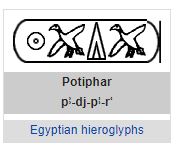Joseph – Career Success

The story of Joseph is considered one of the greatest stories in literature. His story is filled with twists and turns, good and evil. The reason people love Joseph’s story so much is because it is a story in which God is working behind the scenes. God used the events in Joseph’s life to accomplish his purpose of preparing a nation to carry out his work of reconciling humanity unto himself.
Readers of Joseph’s story, however, do not really grasp the great adversity Joseph faced before he became the prime minster of Egypt. Joseph was seventeen years old (Genesis 37:2) when he, by the devious actions of his brothers, was sold to a group of merchants. Joseph was thirty years old when he came before Pharaoh (Genesis 41:46) and offered his advice on how to deal with the coming famine.
During these thirteen years, Joseph was sold as a slave to Potiphar, one of Pharaoh’s officials, who served as the captain of the guard (Genesis 39:1). He was sent to prison because of a false charge of rape. He lived in a foreign country with a different culture that his own culture. He lost his family, his freedom, and the world he knew. Faced with so many hardships and deprived of the love of his father, Joseph could have given up and accepted his fate as something that could not be changed.
Joseph’s Career Success
Although Joseph spent years working as a slave and although he spent years in a dungeon, Joseph showed an amazing strength of character. Joseph had a capacity of enduring hardship, and he was able to prosper in adversity. Throughout his ordeal, Joseph demonstrated his faithfulness as servant of Potiphar and as a trusted worker during his days as a prisoner. God’s presence with Joseph gave him the power to succeed in everything he did.
During his lifetime, Joseph had four different Jobs, one in Canaan and three in Egypt. In each of his positions, Joseph succeeded because he brought a unique perspective on the work that needed to be done. Each of Joseph’s employments was seen as an opportunity to be a faithful worker and to be of help to others.
Joseph as a shepherd
Joseph’s first job was in his father’s business. Jacob had a large flock and Joseph did what his father requested of him, “Joseph, being seventeen years old, was shepherding the flock with his brothers” (Genesis 37:2).
The Hebrew construction of verse 2 is ambiguous. The English translation, “shepherding the flocks with his brothers,” takes the Hebrew word ‘et as a preposition meaning “with,” and translates the sentence as “with his brothers.” However, the Hebrew word ‘et can also be understood as the sign of the direct object of the verb. If the ‘et in verse 2 is the sign of the direct object, then the translation would be, Joseph “was shepherding his brothers.”
The Hebrew text seems to indicate that Jacob appointed Joseph as the supervisor of his brothers. That is the reason Joseph was asked by his father to check on the welfare of his brothers and of the flocks and bring back a report to him (Genesis 37:14). Hamilton provides an explanation to Joseph’s work as a shepherd, “this verse [provides] an excellent introduction to the Joseph story . . . What Joseph is doing during his teen life is exactly what he will be doing in his adult life —caring and providing for those who are dependent on him” (Hamilton 1995:382).
Joseph as a slave in Egypt
After the merchants bought Joseph, they “sold him in Egypt to Potiphar, one of Pharaoh’s officials, the captain of the guard” (Genesis 37:36). Joseph began his life in Egypt as a common slave bought in the slave market. In Potiphar’s house, Joseph came as a household servant. Soon Joseph became the house manager and when Potiphar saw that Joseph was a good and faithful worker, Potiphar “made him overseer in his house and over all that he had” (Genesis 39:5).
Because Joseph was the estate manager for Potiphar, the Lord blessed Potiphar, “the LORD blessed the Egyptian’s house for Joseph’s sake; the blessing of the LORD was on all that he had, in house and field” (Genesis 39:5).
Joseph as a prisoner
Because of a false accusation against him, Joseph was put into a prison where the enemies of Pharaoh were confined. Joseph came to prison as a common criminal, from a position of power to a position of utter humiliation. In prison, Joseph became a model prisoner and soon he was in good terms with the warden. When the warden saw that Joseph was a responsible person, the warden put Joseph in charge of all the prisoners who were in prison (Genesis 39:22). Joseph was put into prison as a common criminal and ended up being the deputy warden of the prison.
Joseph as a government official
Joseph’s elevation from a prisoner to government official took a long time, it took “two whole years” (Genesis 41:1). When Joseph came before Pharaoh, Joseph came as an interpreter of dreams (Genesis 41:15). When Pharaoh discovered that Joseph could interpret dreams, Joseph became a strategic consultant to Pharaoh and presented a plan to deal with the coming famine, “The plan seemed good to Pharaoh and to all his officials” (Genesis 41:37 NIV). As a result of Joseph’s proposal, Pharaoh told Joseph, “You shall be over my house, and all my people shall order themselves as you command; only with regard to the throne will I be greater than you” (Genesis 41:40). Joseph went from a prisoner who could interpret dreams to become the second most powerful man in Egypt.
Working for Potiphar
Joseph came to Potiphar’s house against his will. He was sold by his brothers to a group of merchants who then sold him as a slave in the slave market in Egypt. The man who bought him probably had many other slaves because he was a rich and powerful official in the Egyptian government.
Joseph’s new master was Potiphar, “an officer of Pharaoh, the captain of the guard” (Genesis 39:1). His title does not imply that Potiphar was a lowly servant of Pharaoh. Rather, his title indicates that he was a very high official of Pharaoh, one who exercised a high administrative function in the Egyptian government.
Potiphar bought Joseph as a slave in the slave market. Most slaves sold in the slave markets were captives of war. Others were people who sold themselves and their children in order to pay a financial obligation. Joseph’s situation was different. Joseph was sold for money. Joseph was bought in the slave market probably to do domestic work or to do labor service on the property of his master.
When Joseph came to Potiphar’s house, he was described as “a successful man” (Genesis 39:2). The Hebrew expression literally means “a man who succeeds.” Joseph was able to succeed in his work because “the LORD was with him” (Genesis 39:3). Twice the writer of Genesis says that Yahweh was with Joseph (39:2, 3). Because Yahweh was with Joseph, “Yahweh blessed the Egyptian’s house for Joseph’s sake” (Genesis 39:5).
When Potiphar saw that Yahweh was with Joseph and that Yahweh made everything he did prosper, Potiphar promoted him from a household servant to manager of his whole estate. The text does not say how Potiphar “saw” that Yahweh was with Joseph. Since Joseph knew that Yahweh brought him to Egypt (Genesis 45:5), it is possible that Potiphar had observed Joseph worshiping God in private.
Working for the Prison Warden
While Joseph was working in Potiphar’s house, he was falsely accused of raping his wife. As a result of the malicious accusation, Potiphar put Joseph in prison. In Hebrew the prison is called “the roundhouse.” This prison probably was a dungeon located in the bottom of the palace of the king where Pharaoh’s enemies were detained (Genesis 39:20). Joseph was detained in this prison because he had supposedly committed a severe offense against one of Pharaoh’s officers.
The biblical writer says twice that Yahweh was with Joseph in prison (Genesis 39:21, 23). While Joseph was in prison, “The LORD reached out to him with his unchanging love and gave him protection” (Genesis 39:21 GWN). Because Yahweh was with Joseph, the prison warden became a friend of Joseph.
In prison, Joseph became a model prisoner. The warden, recognizing that Joseph was a reliable person, a person who could be trusted with the affairs of the prison, “put Joseph in charge of all those held in the prison, and he was made responsible for all that was done there” (Genesis 39:22 NIV).
The secret of Joseph success, first in Potiphar’s house and then in prison, was Yahweh’s presence with Joseph. Because Joseph recognized that Yahweh was present in his life, he was diligent in the work he performed and served his masters as a faithful servant.
Joseph succeeded in everything he did because “the LORD was with him” (Gen 39:3). Von Rad said that the constant presence of Yahweh with Joseph “implies quite real protection and promotion in the matters of his external life, not, to be sure, protection from distress, but rather in the midst of distress” (von Rad 1973:367).
The Theology of Work
While Joseph was in Egypt, Joseph worked in different kinds of Jobs. The work that Joseph did was important to God because it was part of God’s purpose in preparing a nation to work together with him to bless the nations of the world.
Work is an essential part of God’s intention for his creation. When God created human beings, God gave humans the responsibility to continue the work of creation that he had initiated, “God created humankind in his image, in the image of God he created them; male and female he created them. God blessed them, and God said to them, ‘Be fruitful and multiply, and fill the earth and subdue it; and have dominion over the fish of the sea and over the birds of the air and over every living thing that moves upon the earth’” (Genesis 1:27–28).
From the beginning, God expected his creation to work, “The LORD God took the man and put him in the Garden of Eden to farm the land and to take care of it” (Genesis 2:15 GWN). God also commanded his people to work, “Six days you shall labor and do all your work” (Exodus 20:9).
God calls people and endows them with skills and guidance for them to do their work.
God called Noah to build the ark. God placed Joseph in a position of political leadership in Egypt. God called Bezalel and Oholiab as chief craftsmen and gave them the skills needed for building the tabernacle (Exodus 31:1–6).
In his article on the theology of work, William Messenger wrote, “we must acknowledge God’s command that everyone work to the degree they are able. God’s command or call to work comes at the very beginning of the Bible, where God chooses to involve human beings in the work of creation, production, and sustenance. Work continues through to the very end of the Bible. There is work in the garden of Eden, and there is work in the New Heaven and New Earth” (Messenger 2011:171-172).
Application
On August 29, 2021, my pastor Jeff Griffin, Senior Pastor of The Compass Church in Naperville, Illinois preached a sermon on Genesis 39:1–6, 20–23 titled “Joseph – Career Success.” The post above is based on Jeff’s sermon.
In his sermon, Jeff says that Joseph had success in all his jobs and the reason Joseph succeeded in his work was because God was with him. Joseph had a strong work ethics, but the greatest key to his success was God.
Joseph knew that Good was part of his work. God played an important part in the work Joseph did for his masters. Jeff introduces three roles God played in Joseph’s life at work.
At work, God was Joseph’s partner. The Lord was with Joseph, right by his side, doing the work with him (Genesis 39:2, 21). Joseph was away from his family, living in a different culture, away from his native land, but God was right there with Joseph. Joseph felt the presence of God in his work.
At work, God was Joseph’s passion. The abiding presence of God in his life was the strong motivation Joseph needed to do his work and excel in what he did. Joseph was not motivated by money. He was not paid for the work he did. Joseph was not motivated by the nobility of his position. He was just a slave working for his masters.
The words of the apostle Paul explain the passion behind Joseph’s work, “Whatever you do, work at it with all your heart, as working for the Lord, not for men” (Colossians 3:23 NIV).
At work, God was Joseph’s power, providing him the strength he needed to do his work. The Lord was helping Joseph and it was the Lord who made everything Joseph did prosper (Genesis 39:3, 23). The Lord was the key for Joseph’s success.
Jeff concluded his sermon by challenging Christians to invite God to be part of their work life. Christians must lean on God in their needs or when they are facing stressful situations. Christians must lean on the power of God to accomplish whatever task they must accomplish. Christians must invite God to be involved in every aspect of their daily life, include their work. Christians need God’s power to do their work well. When Christians invite God to be part of their work, everything changes.
Video Presentation
Sermon: “Joseph – Career Success” A Sermon by Jeff Griffin
The Complete Series on the Life of Joseph – Seven Studies
Other Sermons by Jeff Griffin
Claude Mariottini
Emeritus Professor of Old Testament
Northern Baptist Seminary
NOTE: Did you like this post? Do you think other people would like to read this post? Be sure to share this post on Facebook and share a link on Twitter or Tumblr so that others may enjoy reading it too!
I would love to hear from you! Let me know what you thought of this post by leaving a comment below. Be sure to like my page on Facebook, follow me on Twitter, follow me on Tumblr, Facebook, and subscribe to my blog to receive each post by email.
If you are looking for other series of studies on the Old Testament, visit the Archive section and you will find many studies that deal with a variety of topics.
BIBLIOGRAPHY
Hamilton, Victor P. The Book of Genesis 18–50. New International Commentary on the Old Testament. Grand Rapids: Eerdmans, 1995.
Rad, Gerhard von. Genesis. Old Testament Library. Philadelphia: Westminster Press, 1973.
Messenger, William. “Calling in the Theology of Work.” Journal of Markets & Morality 14 no 1 (Spring 2011): 171-187.








